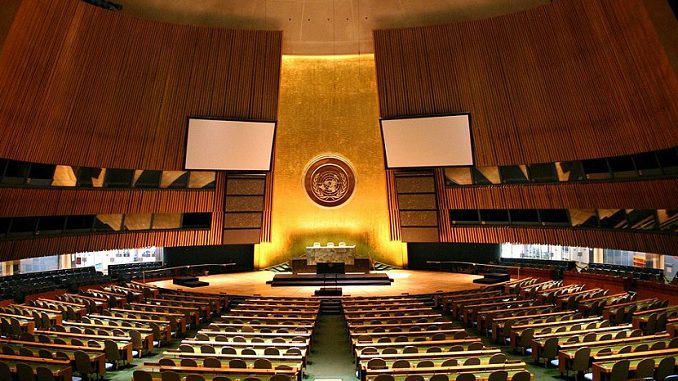by RAMZY BAROUD

United Nations General Assembly PHOTO/Patrick Gruban, via Wikimedia Commons
There is a rational explanation of why India and Brazil, two countries with vast populations and significant and growing economies, are not permanent members of the United Nations Security Council (UNSC).
The Council – made up of 5 permanent and ten rotating members – was designed to reflect a world order that was birthed from the horrific violence of World War II. It was as simple as this: Those who emerged on the side of the victors were granted permanent membership and a ‘veto’ power that would allow a single country to defy the will of the entire international community.
This unfair system, which has perpetually weakened the moral foundation of the UN, remains in effect to this day.
The 73rd session of the UN General Assembly just held in New York reflected both the impotence of the UN’s ability as a global platform to address pressing problems and also the chaotic political scene resulting from the organization’s lack of unity.
The misuse of the veto, the lack of accountability and the unfair representation at the UNSC – for example, not a single African or Latin American country is a permanent member – have all emasculated an organization that is meant, at least on paper, to uphold international law and achieves peace and global security.
While Richard Falk, the former UN Special Rapporteur, advocates the “need for a stronger UN,” he argues that “from the perspective of current geopolitical trends (the UN) seems to have declined almost to the vanishing point with respect to overarching challenges that states acting on their own cannot hope to overcome.”
Some of these problems are interconnected and cannot be redeemed through short-term or provisional solutions. For instance, climate change often leads to food shortages and hunger, which, in turn, contribute to the rising levels of migration and, consequently, to racism and violence.
Late last year, the UN’s World Food Program reported that global hunger is increasing, despite all attempts to curb it and to, ultimately, achieve the declared goal of ‘zero hunger.’ According to the WFP, 815 million people suffered from hunger in 2016, an increase of nearly 40 million from the previous year. The UN body called the latest figure an ‘indictment to humanity.’
The failing fight against climate change is another ‘indictment to humanity’. The UN-sponsored Paris Agreement of 2016 was a rare shining moment for the UN, as leaders from 195 countries consented to reduce their carbon dioxide emission through the lowering of their reliance on fossil fuel. The excitement, however, soon died out. In June 2017, the United States government pulled out of the global accord, putting the world, once more, in peril of global warming with its devastating impact on humanity.
This decision by the US Donald Trump Administration exemplifies the foundational problem within the UN – where one country can dominate or derail the whole international agenda, rendering the UN practically irrelevant.
Interestingly, the UN was established in 1945 to replace a body that, too, was rendered irrelevant and ineffective: The League of Nations.
But if the League of Nations lost its credibility because of its inability to prevent war, why has the UN survived all these years?
Palestine Chronicle for more